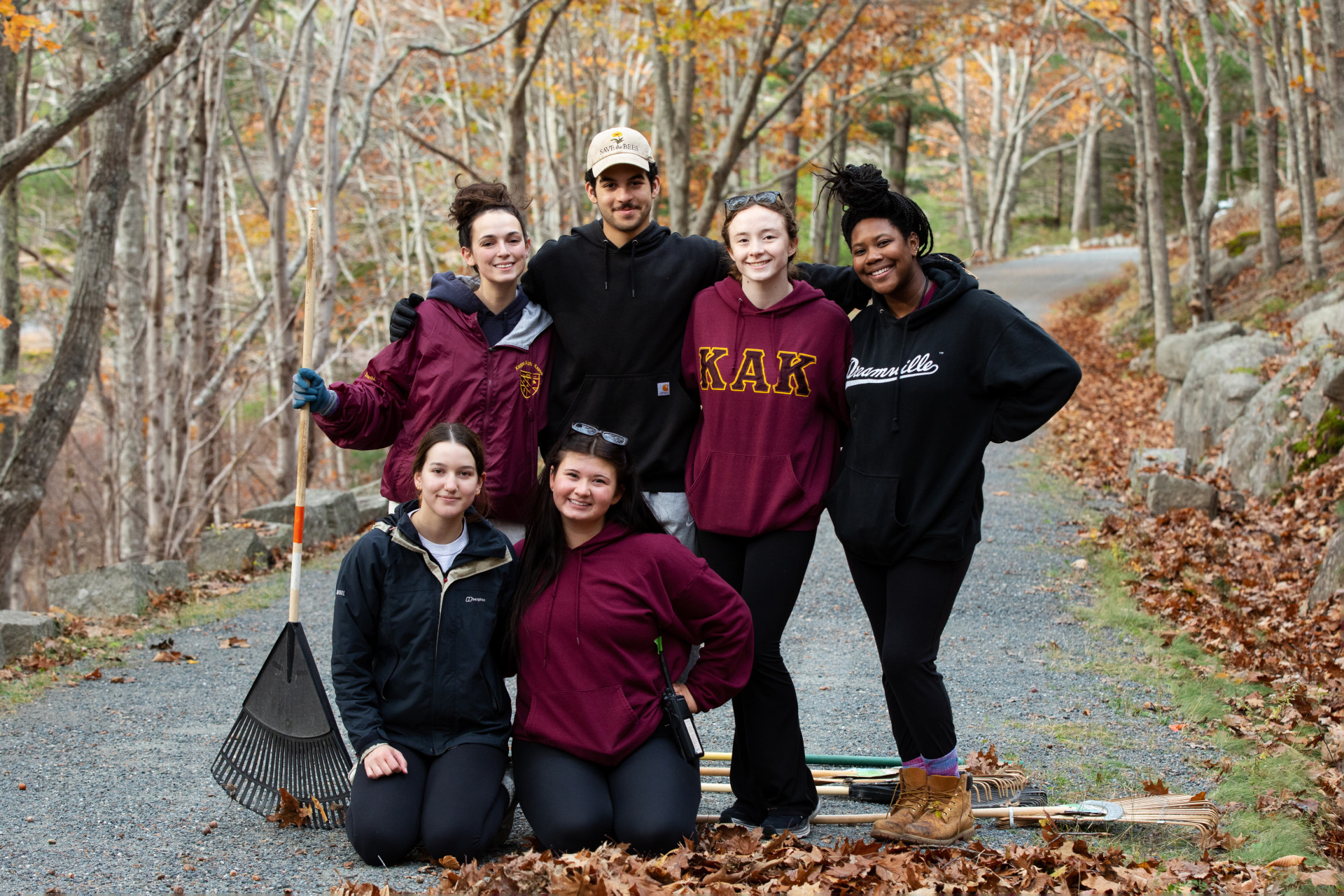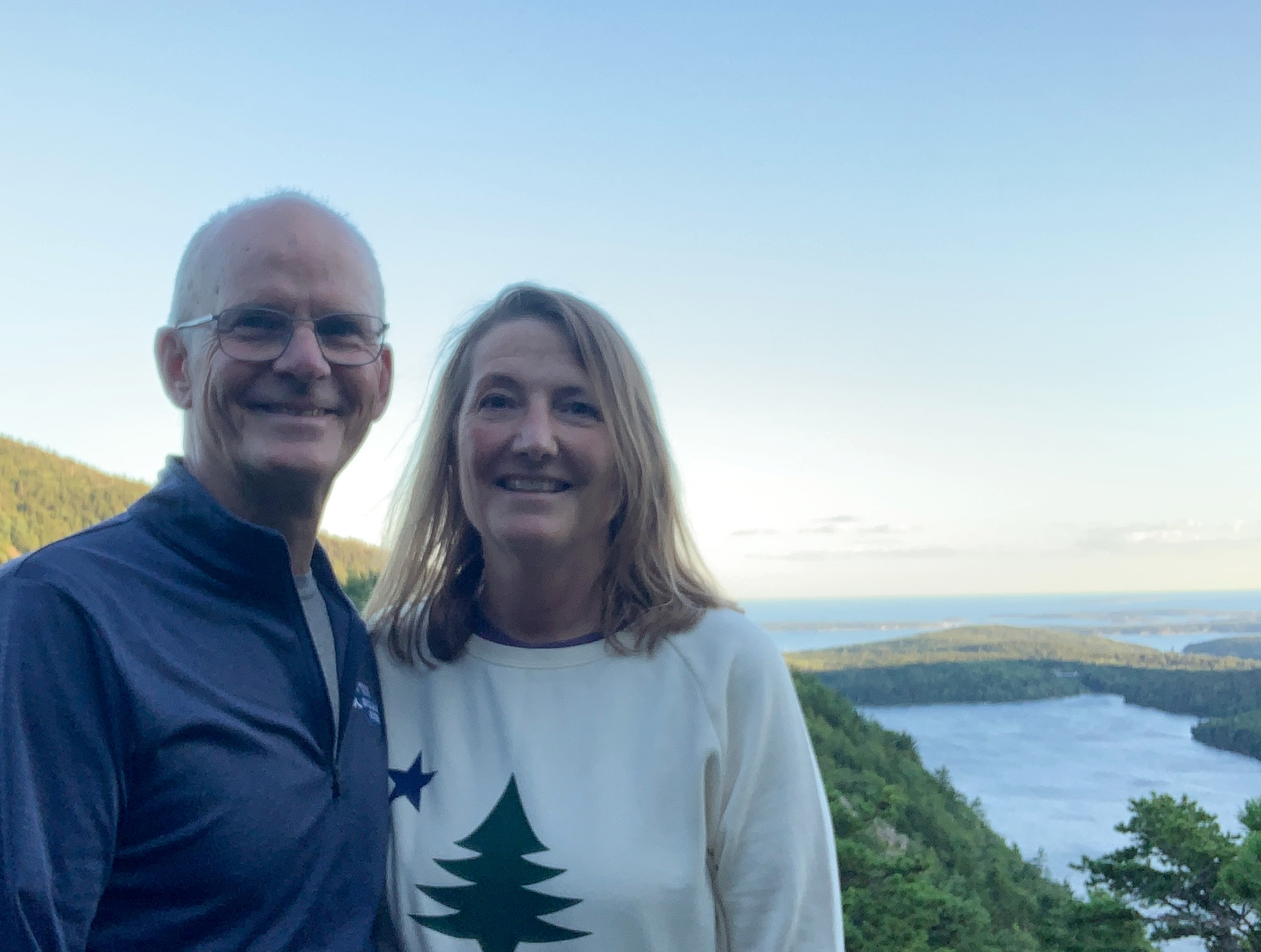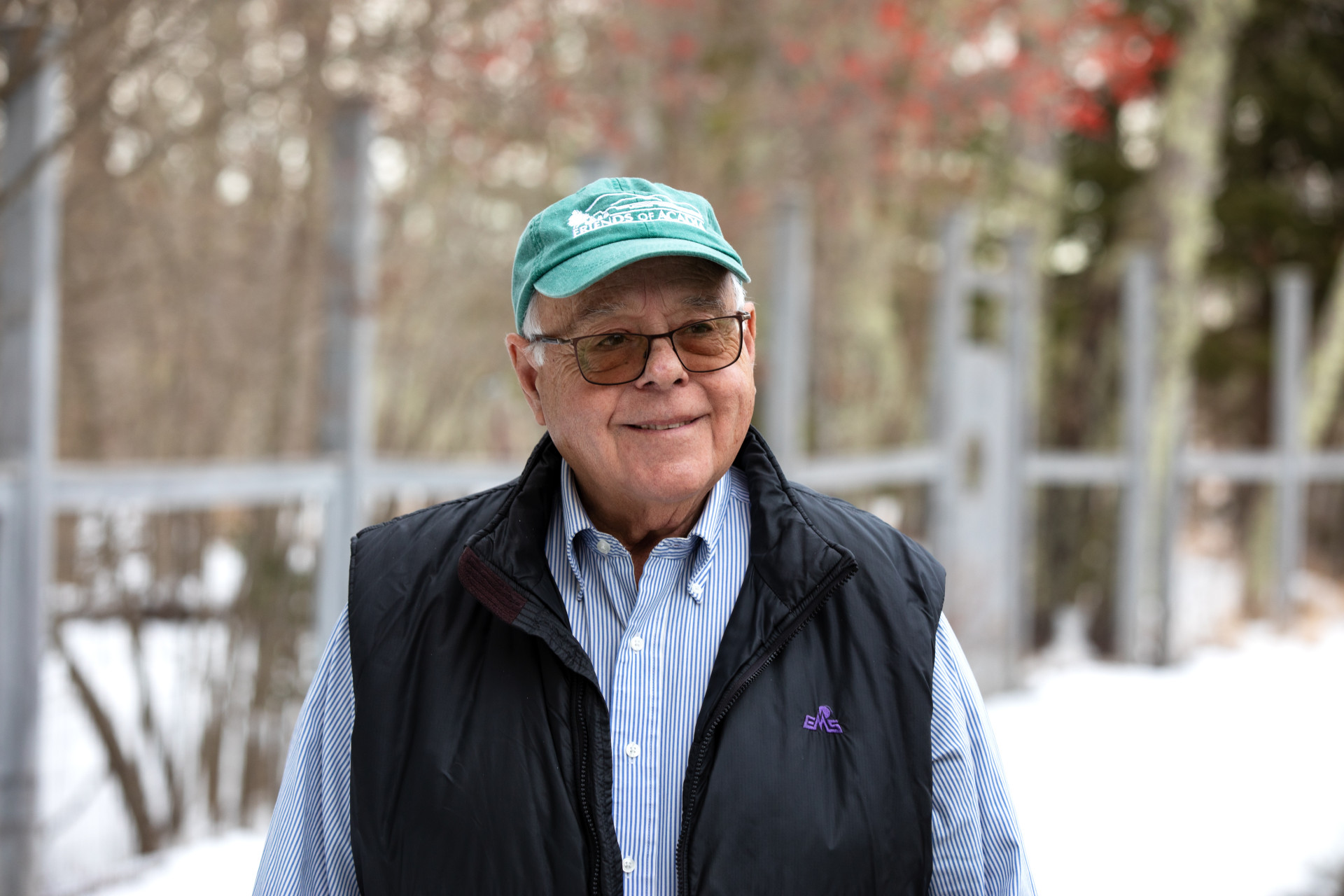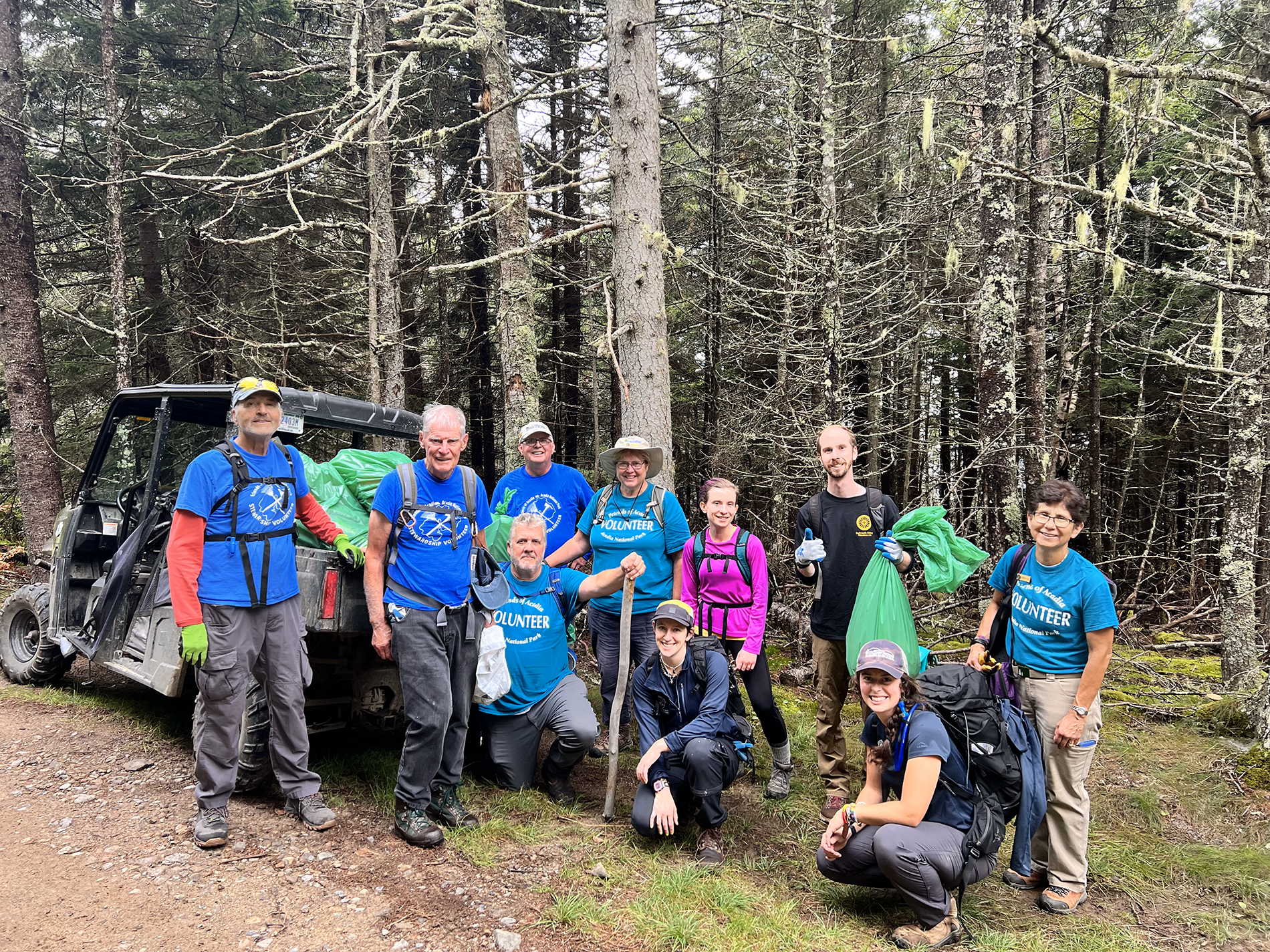The Power of Volunteers
Volunteers represent not only tangible benefits to the park through the work they do, but they pass on the message of stewardship and inspire others.
April 4th, 2024
Volunteers represent not only tangible benefits to the park through the work they do, but they pass on the message of stewardship and inspire others.
April 4th, 2024
By LYNN FANTOM
When Alan Rosenquist greets visitors to the Wild Gardens of Acadia, he says, “You have two choices. You can walk right through and see everything – all the plants are labeled – or I can give you the one- to two-minute
overview.”
Just about everybody wants to hear his spiel, as the retired neuroscientist from Philadelphia describes it. So, standing beside a map, he continues, “If you don’t have the time or inclination to walk all the wonderful trails in Acadia National Park, you can get a good sense of the 13 key plant communities in the park by taking a leisurely stroll here through the Wild Gardens.”
Rosenquist’s ability to put people at ease and add a personal touch to a learning experience encapsulates the special power of volunteers.

Sierra Sheehan (left), 10, and Caroline van Dongen, 10, of Girl
Scout Troop 760, work to collect trash from the side of the road during
Friends of Acadia’s Earth Day Roadside Cleanup in 2022•Members of the
Kappa Alpha Kappa Sorority at the University of Maine Machias stop for a
photo during the 2023 Take Pride in Acadia Day. (Photo by Julia Walker Thomas/Friends of Acadia)
As Friends of Acadia celebrates National Volunteer Week (April 14-20), the spotlight is on those who freely give their time and talents not only to getting things done but also to helping people re-connect with nature – and each other.
Through an array of annual events, drop-in programs, and committees, “volunteers accomplish a huge amount that the park’s paid professional staff isn’t able to get to,” says Friends of Acadia Vice President of Conservation Stephanie Clement.
What’s more, their impact extends into the social realm. As technology today is redefining human connection, volunteers are bridging the isolation inflicted by social media and reclaiming conversation with questions as simple as, “Where are you from?”

Membership Table Volunteers Todd and Jill Brown. (Photo courtesy the Browns)
Jill and Todd Brown from Maryland volunteer at the membership table at the Jordan Pond House, where park visitors can join or renew their membership in Friends of Acadia.
“The thing that I like best is talking to people about their love for the park and finding out what motivates new visitors to come and what they’re interested in,” says Jill, who began volunteering in 2013 when her son was working for the Acadia Youth Conservation Corps.
The Browns started spending time in Acadia when their boys, now in their twenties, were five and seven. “We kind of raised our kids on MDI, so we have suggestions for families with younger children, middle schoolers, high schoolers, adult children,” says Jill.
Her husband Todd began volunteering himself last summer and also enjoys talking to people. “You’ve got that instant connection with people at a very uncomplicated level, which is really just about the beauty of the place,” he says.

Wild Gardens of Acadia Volunteer Alan Rosenquist. (Photo by Julia Walker Thomas/Friends of Acadia)
“Even with the incredible diversity of our visitors, we’re part of the same club – people really interested in plants and the natural environment,” says Rosenquist, now a Southwest Harbor resident who began volunteering at the Wild Gardens of Acadia about eight years ago.
“What probably means the most to me is to see kids who aren’t walking around like zombies with an iPhone but are really engaged and want to go see the carnivorous plant or the frogs in the pond,” he adds.
Created in 1961, the gardens showcase 400 plant species, all indigenous, displayed in habitats that represent Acadia’s plant communities such as mountain, heath, seaside, and coniferous forest.
A group of volunteers, joined by two Friends of Acadia staff, “keeps the garden going and growing,” Rosenquist notes.
“And we see our visitors extremely engaged, from the young to the old. The garden is nice and shady, a very calm, relaxing place. People like being there.
“For me, meeting people from all over the country – really all over the world- is fun,” he continues. “You can tell when people want to talk and linger. It’s fun to engage and make them feel like a person, like a valued visitor.”

Stewardship
Volunteer Rachel Faith (center in purple) poses for a photo with other
stewardship volunteers and crew leaders after a cleanup on Isle au Haut last summer (Photo by Nikki Burtis/Friends of Acadia)
“I also really enjoy meeting other volunteers—there’s such an interesting array of people from so many different places,” says Rachel Faith. Last summer she was a regular at Friends of Acadia’s Drop-in Stewardship Volunteer Program, which helps maintain Acadia’s carriage roads and trails.
“I learned a lot about trimming brush and the best way to go about it, considering both hikers and the plants themselves. I helped build a split-rail fence, which was a new experience for me,” says Faith, who is a freelance translator.
A Maine native, she grew up enjoying Acadia with family and friends. “I love the opportunity to explore the park while helping to maintain it. I was able to leave the trails and paths definitively better than I found them,” she says.
“And I’m glad I can help Acadia mitigate some of the erosion and damage caused by the new severe weather events we’ve been experiencing,” she says, adding, “I also love that some of the work we do in the park helps make it more physically accessible to a broader range of people.”
“People want to give back to this park, whether by financial contributions, specific talents, or donating volunteer time,” says Clement. “The beauty is that Friends of Acadia is able to facilitate that.”
In 2023, volunteers dedicated 9,458 hours to Friends of Acadia, which was founded as a volunteer-powered organization in 1986. Those hours included time spent volunteering in the park and in Friends of Acadia’s Bar Harbor office, performing essential duties such as assisting with mailings and assembling membership packets.
Friends of Acadia offers a depth and breadth of volunteer programs in partnership with Acadia National Park, emphasizes Lori Schaefer, who oversees communications and marketing. Two big annual ones have now become Friends of Acadia signature events: welcoming spring with the Earth Day Roadside Cleanup in April and helping to prepare the park for its winter rest with the Take Pride in Acadia Day in November.
The park itself also offers direct volunteer opportunities, both short- and long-term. But whether through Friends of Acadia or the National Park Service, volunteers make a big difference.
Says Dianna Sproul, Volunteer Coordinator of Acadia National Park, “These people are stewardship actualized.
They’re conservation in action. They represent not only tangible benefits to the park through the work they do, but they pass on the message of stewardship and inspire others.”
> Learn more about Friends of Acadia volunteer programs.
LYNN FANTOM is a former New York advertising executive who has embraced her second career as a freelance writer in Maine.